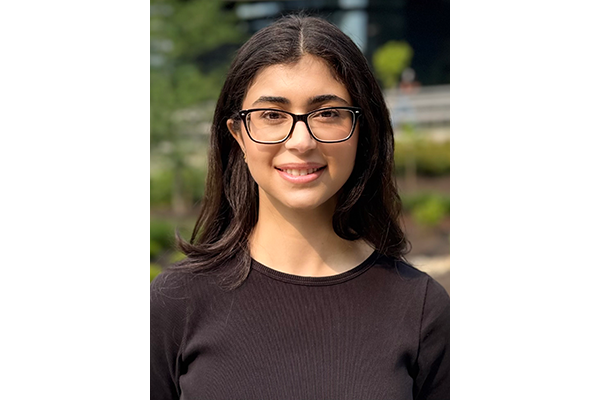Discovering a Passion for Research

Rania Alshawabkeh, E’25, MS’26, electrical and computer engineering, had the opportunity to be a part of four different research labs during her academic career. With each experience, she was able to expand her research skills and abilities and discover her passion for research.
Rania Alshawabkeh started her undergraduate studies at Northeastern University with an undecided major. However, growing up in a household of engineers, Alshawabkeh was always drawn to that area of study. She was curious to learn how things were built and why they worked. Combined with her interests in math and physics, Alshawabkeh found her way to the electrical engineering major.

Alshawabkeh at her undergraduate graduation in May of 2025.
Alshawabkeh completed her bachelor’s degree in electrical engineering in May of 2025 but will continue her education at Northeastern in the university’s PlusOne program. In the PlusOne program, she will be pursuing her master’s degree in electrical and computer engineering with a concentration in microsystems, materials and device pathways. She was interested in the PlusOne program since she was looking for a specific curriculum that would expand her knowledge and exposure in micro and nanotechnology. Additionally, she was fond of being able to complete her degree in a shorter time span so she can more quickly enter the workforce in an industry she is passionate about.
She will be completing her master’s degree in May of 2026, and her academic journey at Northeastern will be coming to an end. Throughout her undergraduate and graduate studies, Alshawabkeh has participated in four research labs. Through these experiences, she has been able to grow her knowledge in engineering, as well as sharpen her research skills and abilities.
Research at the Speech and Neurodevelopment Lab
During her first year of undergraduate studies, Alshawabkeh participated in her first research opportunity with Professor of Communication Science and Disorders Emily Zimmerman. She decided to pursue this research because she wanted an introduction to the research side of the engineering field. Alshawabkeh was a research assistant at the Speech and Neurodevelopment Lab, where the research was focused on tracking the feeding behaviors of infants. She was tasked with assisting with designing a rudimentary spoon that was able to track the pressure and temperature of the person using it. This research experience was Alshawabkeh’s first exposure to the engineering field.
RIVeR Lab
Alshawabkeh completed her first co-op experience at RIVeR Lab with Electrical and Computer Engineering Professor Taskin Padir. During her interview, she was invited to see the research lab in person, and her interest was immediately piqued. When she started her co-op, she was put on a project titled “DARPA Perceptual Task Guidance.” The goal of this project was to develop an augmented reality headset for mechanics or medical professionals to assist them with procedures and other tasks. For medical professionals, the headset would be used to guide them through the steps of surgeries and alert them to what tools were in their vicinity using a sensor system. Alshawabkeh’s specific role on the project was helping with object localization. This allowed the headset to identify where the objects were in the real world and put them into the augmented reality world.
During this research experience, Alshawabkeh had the opportunity to attend a conference where the project would be presented. This research was in collaboration with the University of Florida and in the weeks leading up to the conference, both universities were working in person together to help finish the project. Alshawabkeh said this experience was a core memory for her during her entire co-op. She was amazed at everyone’s dedication and loved seeing so many people from different backgrounds come to collaborate towards a collective goal.
Advanced Microsystems and Materials Lab

Alshawabkeh testing biosensors at the AMML.
After Alshawabkeh’s co-op at RIVeR Lab, she wanted to continue her involvement in research. Her co-op experience sparked her interest in working with sensors, which ultimately led her to the Advanced Microsystems and Materials Lab. She joined the AMML as a research assistant to gain more experience in an area she is enthusiastic about. At the AMML, she helped to develop biosensors for a non-invasive device used to determine an individual’s blood glucose level. This device aims to replace the finger prick, a common method used to track diabetes and blood glucose levels in people. The device the AMML was working on would allow individuals to breathe on the biosensors to determine blood glucose levels. Alshawabkeh also participated in the human trials for these devices and was able to see her work actualized and being tested in the real world.
Institute for NanoSystems Innovation
Alshawabkeh is currently working with the Institute for NanoSystems Innovation at Northeastern. Her research group is exploring a new material in hopes that they can design single-photon detectors from the material they are developing. Alshawabkeh has been tasked with finding how to develop and optimize the material, which has been challenging but intellectually stimulating to her. She believes perseverance is critical to the skills required for research. During this research, she has had to put those perseverance skills to the test in order to succeed in the development of the new material.

Alshawabkeh in the cleanroom at the NanoInstitute.
Future Perspectives
After being a part of four different research labs at Northeastern, Alshawabkeh has built a strong foundation for her research skills. Her research experiences have inspired and directly impacted her future career aspirations. When talking about careers after graduation, Alshawabkeh said, “I can’t see myself working in a non-research environment.” She is grateful that her first lab experience with Professor Zimmerman introduced her to the research environment and that she has been able to continue doing what she loves.
She encourages other students to take advantage of the numerous research opportunities Northeastern has to offer, since they may just discover their love and passion for research.